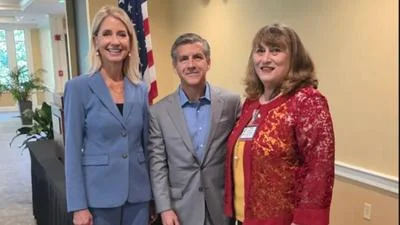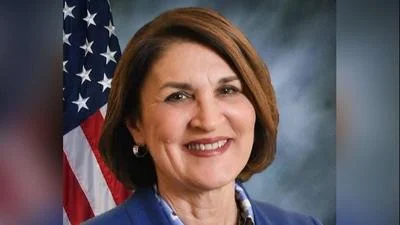Sandy Hamilton | Sandy Hamilton
Sandy Hamilton | Sandy Hamilton
With high inflation rates affecting consumers nationwide, state politicians and candidates in Illinois are speaking up.
Many of the Republican candidates slated for the November election say they believe Springfield should provide long-term relief to consumers, rather than stints of alleviation during times of economic hardship, which have been criticized as "election-year gimmicks."
As part of Gov. J.B. Pritzker's plan to combat soaring prices, it was announced in June that the grocery tax of 1% in Illinois would be suspended from July 1 until June 30, 2023, Newsweek reported. The year-long tax suspension will save taxpayers up to $400 million, even though the state will not lift the 1% tax levy on medicine and hygiene products, the story said.
“In J.B. Pritzker and Doris Turner’s economy, Central Illinois families have to pay more to put less food on the kitchen table," said state Rep. Sandy Hamilton (R-Springfield), a candidate for Illinois state Senate District 48. "Now, Illinois Democrats believe they can trick us by offering up temporary election-year gimmicks that expire after November. I’m calling on the legislature to permanently abolish Illinois’ grocery tax so that Illinois families can feel long-lasting relief and a real reduction in their cost of living.”
The U.S. Bureau of Labor Statistics reported that over the past 12 months, the Consumer Price Index (CPI) for food is at 11.4%. To further break down that percentage change, food at home has increased 13.5% and food away from home has increased 8%.
Illinois Policy provides a broader view of the effects of inflation, reporting in June that the average private-sector worker in Illinois is experiencing what is essentially a pay cut. Over the last 12 months those in the private sector saw a pay bump of more than $3,408, however, to keep up with increases to the cost of living, the rise in wages would need to be $5,635.
Illinois is one of 13 states that taxes groceries, according to the Center on Budget and Policy Priorities. The others are Idaho, South Dakota, Utah, Kansas, Oklahoma, Missouri, Arkansas, Tennessee, Mississippi, Alabama, Hawaii and Virginia. Four of these states, Hawaii, Oklahoma, Idaho and Kansas, have state tax credit that partly offsets the cost of tax, helping lower-income families.
The Center on Budget and Policy Priorities also reported that sales taxes on groceries have a significant impact on low-income families, as they spend more of their income on groceries. By income, the lowest 20% spend 10.3% on food at home, while the highest 20% only spend 5.7%.
Tax Foundation researcher Jared Walczak reported that sales taxes are more economically efficient compared to other methods of taxation, as they are "more stable and pro-growth." Walczak’s reasoning is that "sales tax does less to influence economic decision-making and does not directly tax labor or investment." When sales tax is the main method of state revenue, households are more likely to set aside money for the future while also providing the state with a more stable revenue stream. Another point made was that grocery taxes do scale with income as higher income families will purchase larger quantities of high-quality food and lower-income families will purchase based on need. However, an important component to this is tax credits targeted at low-income households.
The Tax Foundation ranks Illinois 13th in the nation for income tax and shows that the state does not provide recurring tax credits to low-income families, which would suggest that suspending the grocery tax in Illinois is a short-term solution to rising costs.
Hamilton is running as a "conservative who wants to govern while not sacrificing ... core principles." She has been a resident of Springfield for over 20 years and is married with three boys.





 Alerts Sign-up
Alerts Sign-up